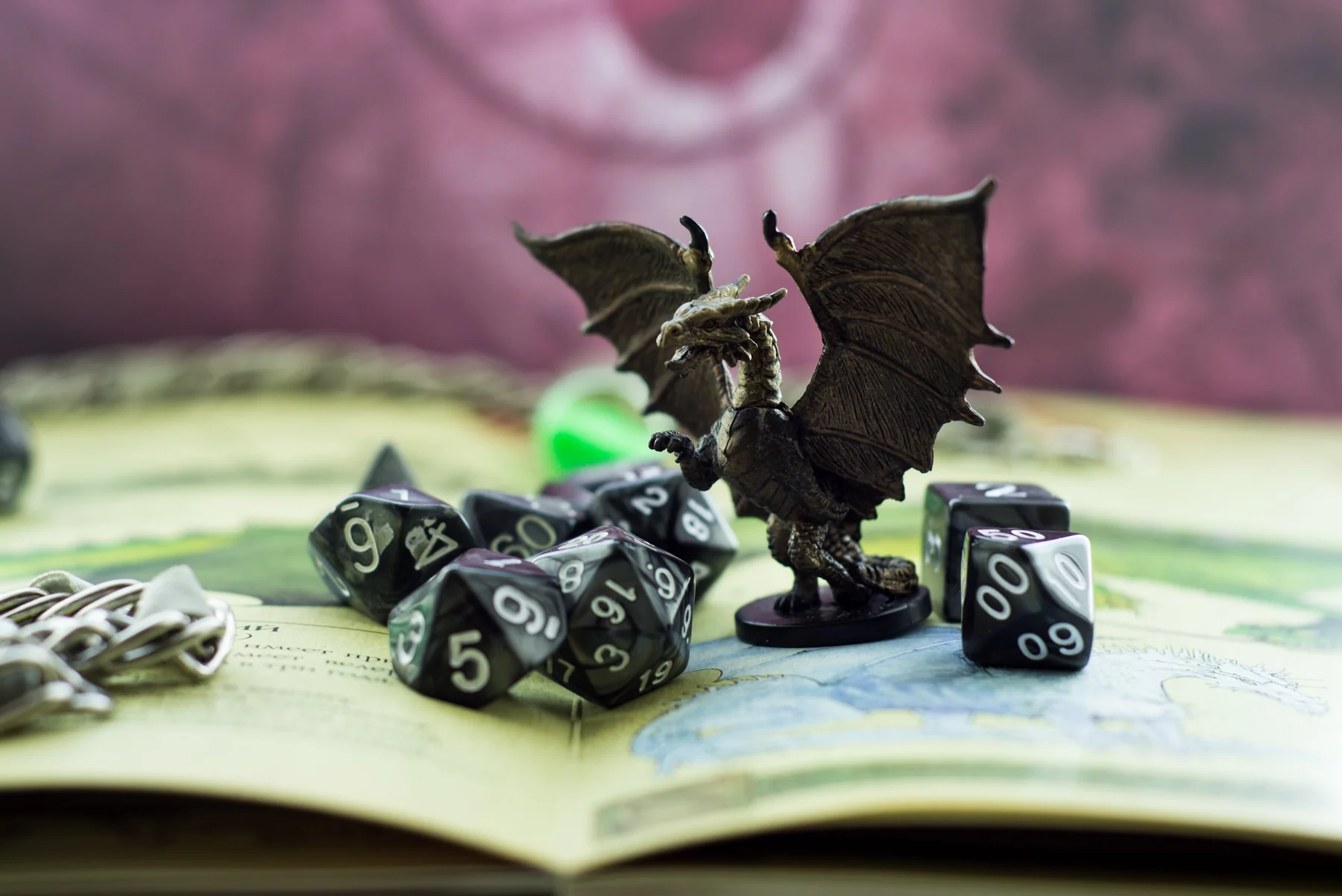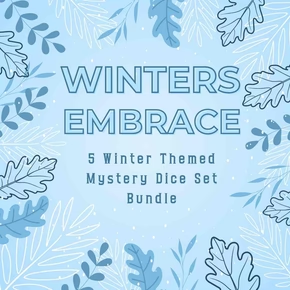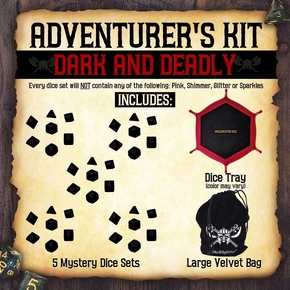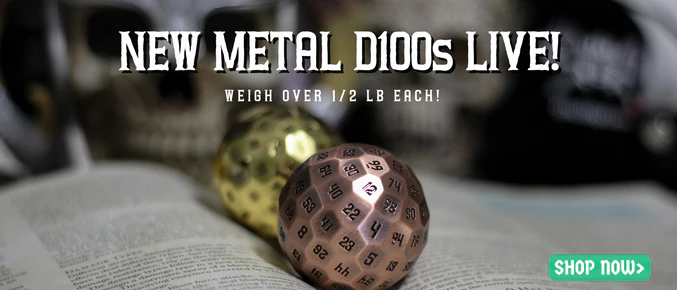
Character Advancement 5E
Table of Contents:
Super Simple Leveling Up
Your character just advanced a level! WOOT! If you’re using online services like D&D Beyond, leveling up is just a simple button press. But what if your characters live on paper? If you’re having difficulties or just need a few quick answers, stick with us while we go through everything you need to know.
What are Class Levels?
Simply put, your class levels represent how strong your character is. As your character battles creatures and delves dungeons, they get more experienced and become stronger. This shouldn’t be too hard of a concept, since it’s reflected in basically every RPG you’ve ever played.

My DM told me to Level Up, Now What?
You get a bunch of stuff when you level up, let’s go through it all step-by-step.
Gain Hit Points
Probably the easiest step is just gaining some HP.
Whenever you gain a level you gain a “Hit Die”, determined by your class. The actual “Hit Die” matters for when you’re taking rests and a few weird abilities, but mainly it just dictates how many hit points you gain. Look at your character sheet and find the “Hit Dice” box, then just add 1 to it, (as a tip, this should also equal your character level).
Look at the top of your class’s “Class Features” section. You should see a bit under “Hit Points” that’ll show what you need. What you need to care about now is the “Hit Points at Higher Levels” bit. You also have a choice to make.
You can either:
- Roll your hit die, and gain hit points equal to the result.
Or
- Take the average (the number in parenthesis) and gain that many hit points.
Whatever amount you ended up with (from the roll or the average) you add your Constitution modifier and add your sweet new hit points to your character’s total!
A Note on DM House RulesMany DMs have their own weird ways of gaining hit points. Some give you free re-rolls if you roll a ‘1’, some will have mulligan rules or other house rules. It’s just a good idea to ask your DM what shenanigans they like to use before rolling a hit die.
Gain Class Features
Simply find your table (most likely in the player’s handbook) and check in the “Features” column what all you get at this new level. Many classes also have spells or other abilities shown on this table, and you should choose new spells and abilities however your class describes (really read your class or one of our class guides if this step is giving you problems).
Check if your Proficiency Bonus went up
Proficiency is a big part of 5e, and you’ll need to check if yours goes up this level.
Unlike your class features, your proficiency bonus cares about your “total character level” not just the levels you have in a particular class (more on that in multiclassing). So, if you have 2 levels of fighter and 3 levels of barbarian, you still count as a 5th level character for your proficiency bonus.
Proficiency starts at +2 and goes up at 5th level, 9th level, 13th level, and 17th level.
Advance Everything that Uses Your Proficiency Bonus
If you just gained a level where your proficiency bonus went up, a bunch of your abilities just improved. Erase the previous totals on your character sheet and put in the new and improved totals in the following places:
- Attacks. All the attacks you normally make (assuming you’re proficient) just went up.
- Saving Throws. You should be proficient in a couple saving throws, those just got better.
- Skills. All those skills your proficient in just improved by 1.
- Spell Attacks. If you’ve got spells, you just got better at slinging them.
- Spell Save DC. Your spells just got harder to resist.
- Other Specials. A bunch of other racial and class abilities use your proficiency bonus, check if you have those and bump them up if you do!
How Do I Use Experience Points?
Most DMs I’ve encountered have phased out experience points altogether in favor of the “milestone” system, in which the DM basically ties level ups to moments of story progression like beating bosses and completing adventures.
Many old-school DMs and things like “The Adventurer’s League” still use experience points though, which means you may be tasked with keeping track of them.
Not to worry though, this is more of a headache for your DM than it is for you. Very simply, whenever your DM tells you that you’ve gained experience points, you’ll need to add them to your experience point total. You should have a spot on your sheet marked “experience”.
Whenever your experience point total reaches certain milestones, you gain a new class level!
Refer to the following table for your experience point advancement:
Experience Based Character Advancement
|
Experience Point Total |
Level |
|
0 |
1 |
|
300 |
2 |
|
900 |
3 |
|
2,700 |
4 |
|
6,500 |
5 |
|
14,000 |
6 |
|
23,000 |
7 |
|
34,000 |
8 |
|
48,000 |
9 |
|
64,000 |
10 |
|
85,000 |
11 |
|
100,000 |
12 |
|
120,000 |
13 |
|
140,000 |
14 |
|
165,000 |
15 |
|
195,000 |
16 |
|
225,000 |
17 |
|
265,000 |
18 |
|
305,000 |
19 |
|
355,000 |
20 |
What’s Multiclassing?
Multiclassing means taking levels from multiple different classes. It’s more complicated than character advancement normally is, so it’s not recommended if this is your first adventure. However, multiclassing can open unique character builds and concepts (and it can enable some wonky power builds).
Note that multiclassing is technically an optional rule, so your DM can put a stop to those multiclass power builds if they’re so inclined.
How Do I Multiclass?
Whenever you gain a new class level, you’re technically choosing to advance in your current class. Instead of gaining that new level in your current class you could instead choose to gain a level in some other class. It’s normally better to advance in your current class, because higher level class abilities tend to be better. When you switch over and gain a level in another class, you’re gaining your 1st level in that class, meaning you’re only gaining the stuff they get at 1st level.
You can still do some pretty cool stuff multiclassing though, and some of the most powerful builds take level dips to gain the perfect synergies.
You’re free to grab a level of whatever you’d like when you level up, but each class has a prerequisite. Each class requires you to have a minimum of 13 in a couple ability scores to start multiclassing into them. You need to meet the prerequisite of your current class in addition to the one you’re multiclassing into. This is mainly to stop wizards taking a dip in barbarian without the buff bods and stop fighters from dipping into wizardry without a bit of book learning.
The following is a table of each class and their multiclassing prerequisite:
Multiclassing Prerequisites
|
Class |
Ability Score Minimum |
|
Artificer |
Intelligence 13 |
|
Barbarian |
Strength 13 |
|
Bard |
Charisma 13 |
|
Cleric |
Wisdom 13 |
|
Druid |
Wisdom 13 |
|
Fighter |
Strength 13 or Wisdom 13 |
|
Monk |
Dexterity 13 and Wisdom 13 |
|
Paladin |
Strength13 and Charisma 13 |
|
Ranger |
Dexterity 13 and Wisdom 13 |
|
Rogue |
Dexterity 13 |
|
Sorcerer |
Sorcerer 13 |
|
Warlock |
Charisma 13 |
|
Wizard |
Intelligence 13 |
What Does Multiclassing Get Me?
So, while you get most of everything from the 1st level of whatever you multiclass into, it’s not quite everything and there’s some squishy rules especially when you get into multiple casting classes.
But fear not! We’ll go through it step by step.
Multiclassing Proficiencies
They didn’t want a single level in paladin to give a wizard heavy armor, so they watered down the starting proficiencies you gain when you go around multiclassing.
The following table shows what proficiencies you get when you begin multiclassing in each class:
Multiclassing Proficiencies
|
Class |
Proficiencies Gained |
|
Artificer |
Light Armor, Medium Armor, Shields, Thieves’ Tools, Tinker’s Tools. |
|
Barbarian |
Shields, Simple Weapons, Martial Weapons |
|
Bard |
Light Armor, one skill of your choice, one musical instrument of your choice |
|
Cleric |
Light Armor, Medium Armor, Shields |
|
Druid |
Light Armor, Medium Armor, Shields (druids will not wear armor or use shields made of metal) |
|
Fighter |
Light Armor, Medium Armor, Shields, Simple Weapons, Martial Weapons |
|
Monk |
Simple Weapons, Shortswords |
|
Paladin |
Light Armor, Medium Armor, Shields, Simple Weapons, Martial Weapons |
|
Ranger |
Light Armor, Medium Armor, Shields, Simple Weapons, Martial Weapons, one skill from the class’s skill list |
|
Rogue |
Light Armor, one skill from the class’s skill list, Thieves’ Tools |
|
Sorcerer |
- |
|
Warlock |
Light Armor, Simple Weapons |
|
Wizard |
- |
Multiclass Spellcasting
This is probably the most confusing bit in multiclassing. I will say though, it’s a lot less confusing than it looks, as most of the confusing language is just there to slap the hands of people trying to find loopholes for power gaming. So, let’s boil everything down to the basics.
Spells Known and Prepared
This part isn’t so bad, mainly because everything stays separated. You learn and prepare your spells from each spellcasting class completely separately. So, your character with 5 wizard levels and 4 cleric levels knows and prepares the same spells as a 5th level wizard, and also as a 4th level cleric. The spell lists don’t mix either, so you’re still picking and preparing everything exactly the same.
You cast spells from different classes using their normal ways as well. So, if one of your classes uses a spell focus, you’ve got to use a spell focus when you cast spells from that class.
Spell Slots
This is where it gets tricky. Multiclass spellcasters have their own weird table for their spell slots. This is complex to stop people from exploiting loopholes, but basically, they want to make sure you can’t jack up the slots for one class by dipping into another. You add up your levels in spellcasting classes and add half your total levels in “half-step spellcasting classes”, then use the following table to figure out your spell slots.
Here are all the “Full Spellcasting Classes”, you add all your levels in these classes together: Bard, Cleric, Druid, Sorcerer, and Wizard.
Here are all the “Half-Step Spellcasting Classes”, you add up all your levels in these classes together then cut them in half: Artificer, Paladin, and Ranger.
Once you’ve got your total, use this table to figure out how many dang spell slots you get!
Multiclass Spellcaster Table: Spell Slots per Spell Level
|
Total Caster Level |
1st Level Spell Slots |
2nd Level Spell Slots |
3rd Level Spell Slots |
4th Level Spell Slots |
5th Level Spell Slots |
6th Level Spell Slots |
7th Level Spell Slots |
8th Level Spell Slots |
9th Level Spell Slots |
|
1st |
2 |
- |
- |
- |
- |
- |
- |
- |
- |
|
2nd |
3 |
- |
- |
- |
- |
- |
- |
- |
- |
|
3rd |
4 |
2 |
- |
- |
- |
- |
- |
- |
- |
|
4th |
4 |
3 |
- |
- |
- |
- |
- |
- |
- |
|
5th |
4 |
3 |
2 |
- |
- |
- |
- |
- |
- |
|
6th |
4 |
3 |
3 |
- |
- |
- |
- |
- |
- |
|
7th |
4 |
3 |
3 |
1 |
- |
- |
- |
- |
- |
|
8th |
4 |
3 |
3 |
2 |
- |
- |
- |
- |
- |
|
9th |
4 |
3 |
3 |
3 |
1 |
- |
- |
- |
- |
|
10th |
4 |
3 |
3 |
3 |
2 |
- |
- |
- |
- |
|
11th |
4 |
3 |
3 |
3 |
2 |
1 |
- |
- |
- |
|
12th |
4 |
3 |
3 |
3 |
2 |
1 |
- |
- |
- |
|
13th |
4 |
3 |
3 |
3 |
2 |
1 |
1 |
- |
- |
|
14th |
4 |
3 |
3 |
3 |
2 |
1 |
1 |
- |
- |
|
15th |
4 |
3 |
3 |
3 |
2 |
1 |
1 |
1 |
- |
|
16th |
4 |
3 |
3 |
3 |
2 |
1 |
1 |
1 |
- |
|
17th |
4 |
3 |
3 |
3 |
2 |
1 |
1 |
1 |
1 |
|
18th |
4 |
3 |
3 |
3 |
3 |
1 |
1 |
1 |
1 |
|
19th |
4 |
3 |
3 |
3 |
3 |
2 |
1 |
1 |
1 |
|
20th |
4 |
3 |
3 |
3 |
3 |
2 |
2 |
1 |
1 |
Multiclassing Warlocks
You may have noticed warlocks strangely absent from all that. That’s because warlocks are weird and aren’t technically spellcasters! This has to do with their whole “always at max slot” thing, and their pact magic doesn’t count as spellcasting for the purposes of multiclassing. When you multiclass a warlock, your warlock levels don’t factor into counting your slots. Instead your warlock slots are always a separate thing. However, you can cast the warlock spells that you know using other class spell slots, and vice versa.
--
Enjoy this Guide? You May Also Like:
Thinking about other classes? Check out our giant list of D&D 5e Tools and Tips here.
Hungry for Adventure? Your group will love these D&D Game Night Snack Recipes
Need New Dice? Check out our Dungeons and Dragons Dice here.
New to find a D&D Group? Check out our guide on How to Find a D&D Group.
Want a character that makes magic items? Check out our Artificer 5e Guide!
Disclaimer
Last updated: January 27, 2019
The information contained on www.SkullSplitterDice.com website (the "Service") is for general information purposes only.
www.SkullSplitterDice.com is a participant in the Amazon Services LLC Associates Program, an affiliate advertising program designed to provide a means for sites to earn advertising fees by advertising and linking to Amazon.com. (source: Section 5)
Blueshift Nine, LLC assumes no responsibility for errors or omissions in the contents on the Service.
In no event shall Blueshift Nine, LLC be liable for any special, direct, indirect, consequential, or incidental damages or any damages whatsoever, whether in an action of contract, negligence or other tort, arising out of or in connection with the use of the Service or the contents of the Service. Blueshift Nine, LLC reserves the right to make additions, deletions, or modification to the contents on the Service at any time without prior notice.
Blueshift Nine, LLC does not warrant that the Service is free of viruses or other harmful components.
Affiliate disclaimer
This affiliate disclosure details the affiliate relationships of Blueshift Nine, LLC with other companies and products.
Some of the links are "affiliate links", a link with a special tracking code. This means if you click on an affiliate link and purchase the item, we will receive an affiliate commission.
The price of the item is the same whether it is an affiliate link or not. Regardless, we only recommend products or services we believe will add value to our readers.
By using the affiliate links, you are helping support the Service, and we genuinely appreciate your support.
Affiliate advertising programs that the Service uses are:
- Amazon Services LLC Associates Program
- As an Amazon Associate, I earn from qualifying purchases.
- Blueshift Nine, LLC is a participant in the Amazon Services LLC Associates Program, an affiliate advertising program designed to provide a means for sites to earn advertising fees by advertising and linking to Amazon.com or endless.com, MYHABIT.com, SmallParts.com, or AmazonWireless.com.
- Pages on this Service may include affiliate links to Amazon and its affiliate sites on which the owner of this Service, Blueshift Nine, LLC, will make a referral commission.

Disclaimer
Last updated: January 27, 2019
The information contained on www.SkullSplitterDice.com website (the "Service") is for general information purposes only.
www.SkullSplitterDice.com is a participant in the Amazon Services LLC Associates Program, an affiliate advertising program designed to provide a means for sites to earn advertising fees by advertising and linking to Amazon.com. (source: Section 5)
Blueshift Nine, LLC assumes no responsibility for errors or omissions in the contents on the Service.
In no event shall Blueshift Nine, LLC be liable for any special, direct, indirect, consequential, or incidental damages or any damages whatsoever, whether in an action of contract, negligence or other tort, arising out of or in connection with the use of the Service or the contents of the Service. Blueshift Nine, LLC reserves the right to make additions, deletions, or modification to the contents on the Service at any time without prior notice.
Blueshift Nine, LLC does not warrant that the Service is free of viruses or other harmful components.
Affiliate disclaimer
This affiliate disclosure details the affiliate relationships of Blueshift Nine, LLC with other companies and products.
Some of the links are "affiliate links", a link with a special tracking code. This means if you click on an affiliate link and purchase the item, we will receive an affiliate commission.
The price of the item is the same whether it is an affiliate link or not. Regardless, we only recommend products or services we believe will add value to our readers.
By using the affiliate links, you are helping support the Service, and we genuinely appreciate your support.
Affiliate advertising programs that the Service uses are:
- Amazon Services LLC Associates Program
- As an Amazon Associate, I earn from qualifying purchases.
- Blueshift Nine, LLC is a participant in the Amazon Services LLC Associates Program, an affiliate advertising program designed to provide a means for sites to earn advertising fees by advertising and linking to Amazon.com or endless.com, MYHABIT.com, SmallParts.com, or AmazonWireless.com.
- Pages on this Service may include affiliate links to Amazon and its affiliate sites on which the owner of this Service, Blueshift Nine, LLC, will make a referral commission.



